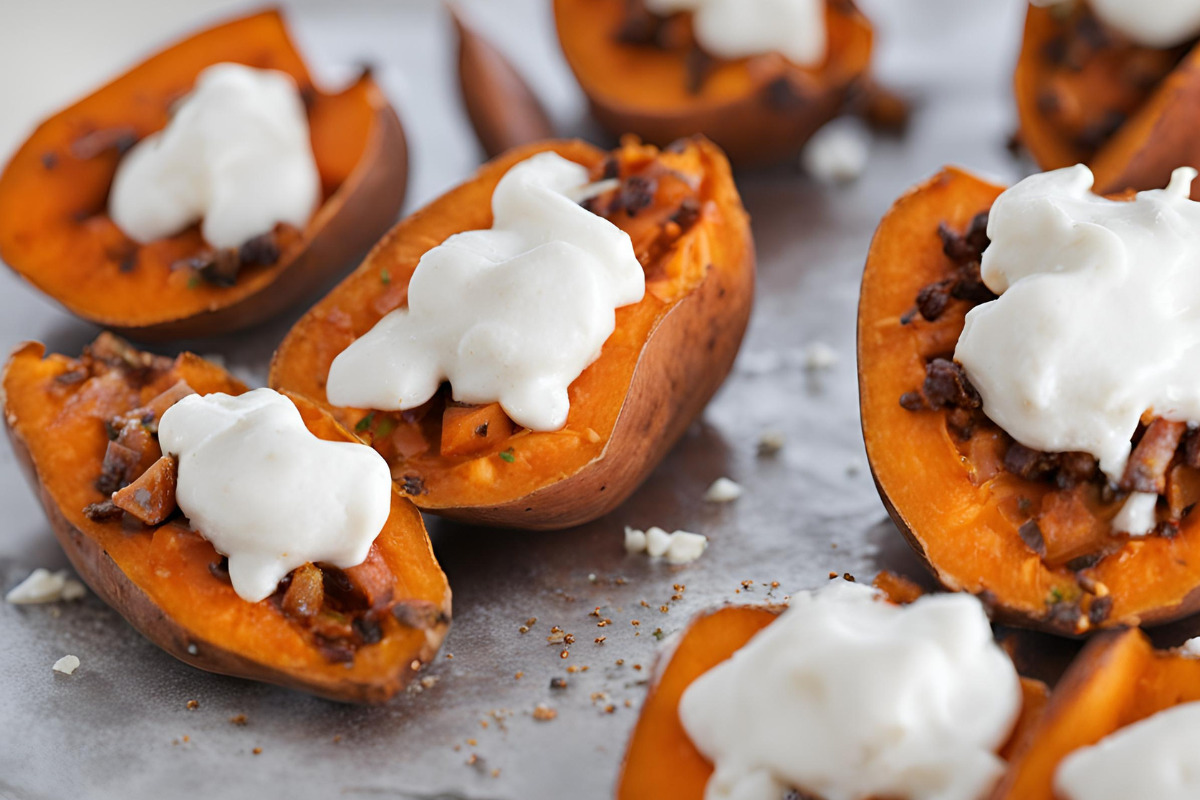Introduction to Cooking Sweet Potatoes: Boil or Bake?
Sweet potatoes stand out not only for their vibrant color and sweet taste but also as a powerhouse of nutrients. As more people turn to healthy eating, the question arises: Is it better to boil or bake sweet potatoes? This article dives into the nutritional implications of each cooking method, examining which might be the better choice for your health and palate. We’ll explore the effects on vitamins, the glycemic index, taste, texture, and more. Join us on this culinary journey to make an informed decision next time you cook these wonderful tubers.
Introduction
Overview of Cooking Methods
Sweet potatoes, a staple in many diets around the world, are cherished not only for their delicious flavor but also for their robust nutritional profile. This root vegetable can be prepared in numerous ways, though boiling and baking are two of the most popular methods. Each technique affects the sweet potatoes’ nutritional value and taste differently, raising a pivotal question for health-conscious foodies and home cooks alike: Is it better to boil or bake sweet potatoes?
By boiling, sweet potatoes retain most of their moisture and can have a lower glycemic index, which is beneficial for managing blood sugar levels. On the other hand, baking can enhance their natural sweetness, making them irresistibly tasty but possibly with a higher glycemic impact. This section sets the stage for a deeper comparison of these two cooking methods, aiming to uncover which method maximizes the health benefits of sweet potatoes without compromising on taste.
Nutritional Comparison of Boiled vs. Baked Sweet Potatoes
Vitamin Retention in Boiling vs. Baking
When it comes to preparing sweet potatoes, the method you choose can significantly impact their nutritional value, particularly in terms of vitamin retention. Boiling sweet potatoes is often seen as a better option for maximizing nutrient retention. This method helps preserve water-soluble vitamins such as vitamin C and B vitamins, which are prone to degradation when exposed to high heat.
In contrast, baking sweet potatoes at high temperatures can lead to a reduction in these vitamins. The prolonged exposure to heat during baking not only diminishes vitamin levels but also affects their overall antioxidant capacity. However, it’s worth noting that baking can increase the bioavailability of beta-carotene, which the body converts into vitamin A.
Glycemic Index Differences
The rate at which food elevates blood sugar levels is measured by the glycemic index (GI). Sweet potatoes are generally considered a healthy choice, but the cooking method can alter their GI. Boiled sweet potatoes typically have a lower GI, making them a preferable choice for those managing diabetes or looking to maintain steady energy levels. This is due to the method of cooking at a lower temperature and often shorter cooking times compared to baking.
On the other hand, baked sweet potatoes tend to have a higher GI. This is attributed to the breakdown of starches into simpler sugars caused by the higher cooking temperatures of baking. For individuals concerned about blood sugar spikes, boiling might be the better method.
Through this comparison, it’s evident that both methods have their pros and cons regarding nutritional outcomes. Whether boiling or baking is better may depend on your specific health goals and dietary needs. In the next section, we delve deeper into each method to provide a clearer understanding of how to prepare sweet potatoes to suit your preferences and health requirements.

Detailed Comparison of Cooking Methods
Boiling Sweet Potatoes
Boiling is a straightforward and quick method for cooking sweet potatoes. To boil sweet potatoes, simply peel (if desired) and chop them into uniform pieces to ensure even cooking. Place them in a pot of boiling water and cook until they are tender, which typically takes about 15 to 20 minutes depending on the size of the pieces. One of the advantages of boiling is that it minimizes the loss of water-soluble nutrients, as mentioned earlier.
Furthermore, boiling is beneficial for those who prefer a softer texture and a more subtle sweetness in their sweet potatoes. It’s an excellent method for dishes like mashed sweet potatoes or salads where a firmer texture is desired. Boiling is also a great choice for baby food, as it yields a gentle, easily digestible consistency.
Baking Sweet Potatoes
Baking sweet potatoes can bring out their natural sweetness and create a delightful, caramelized flavor that’s hard to achieve with boiling. To bake sweet potatoes, preheat your oven, pierce the potatoes several times with a fork (to allow steam to escape), and bake at 425°F (about 220°C) for 45 minutes to an hour, depending on their size.
Baked sweet potatoes develop a crispy skin and a soft, fluffy interior, making them a hit for those who enjoy a textural contrast in their meals. This method is perfect for serving sweet potatoes as a stand-alone dish or as a side that complements a variety of main courses.
Both boiling and baking have their unique benefits and can be chosen based on the desired outcome in flavor and texture. However, from a health standpoint, boiling may edge out slightly due to its lower glycemic impact and better retention of certain nutrients. But remember, the best cooking method is one that will make you enjoy eating sweet potatoes the most, as they are a valuable addition to any diet.
Taste and Texture Analysis
Taste Profiles of Boiled vs. Baked Sweet Potatoes
The cooking method you choose for sweet potatoes can dramatically influence their flavor profile. Boiled sweet potatoes are generally milder in taste with a moist, creamy texture. This method is excellent for those who prefer a subtler flavor, which makes it a versatile base for both sweet and savory dishes. Boiling can soften the sweet potato’s natural sugars, resulting in a gentle, understated sweetness.
Conversely, baking sweet potatoes intensifies their inherent sweetness. The high heat of the oven caramelizes the sugars inside the sweet potatoes, creating a rich, deep flavor that’s both nutty and sweet. This makes baked sweet potatoes particularly appealing for those who enjoy a more pronounced sweetness and a hint of caramel.
Texture Analysis
Texture is another critical aspect affected by the cooking method. Boiled sweet potatoes tend to have a softer, more uniform consistency, which is ideal for purees, baby food, or smooth fillings for pies and pastries. Their moisture-rich texture helps in blending and mixing with other ingredients, providing a smooth, cohesive culinary experience.
Baked sweet potatoes, on the other hand, offer a crispy exterior with a fluffy and airy interior. This textural difference is particularly satisfying for those who appreciate a crunchier skin juxtaposed with a soft, creamy center. The crispy skin also adds a delightful contrast when paired with toppings or used in loaded sweet potato dishes.
Whether you prefer the creamy softness of boiled sweet potatoes or the crisp, fluffy nature of baked ones, each method brings its unique set of sensory pleasures to the table. The choice between boiling and baking may ultimately hinge on personal preference and the specific culinary application envisioned. In the next section, we will explore the health implications of each method to help you make an informed decision based on dietary considerations.

Health Considerations
Antioxidant Levels in Cooking Methods
When selecting a cooking method for sweet potatoes, it’s crucial to consider the impact on their antioxidant content. In order to battle oxidative stress and lower the risk of chronic diseases, antioxidants are essential. Boiling sweet potatoes has been shown to retain a higher amount of antioxidants compared to baking. This is due to the lower temperatures and water-based cooking environment, which helps preserve these delicate compounds.
Additionally, the skin of sweet potatoes, which is often consumed when baked, contains significant antioxidant properties. However, the baking process can significantly reduce these benefits. For those looking to maximize their intake of antioxidants from sweet potatoes, boiling may be the preferred method, especially if the skin is consumed along with the flesh.
Dietary Implications of Each Method
Dietary considerations also play a critical role in deciding whether to boil or bake sweet potatoes. For individuals monitoring their blood sugar levels, the lower glycemic index of boiled sweet potatoes makes them a more suitable option. This is particularly important for those with diabetes or insulin resistance, as managing blood sugar spikes is crucial.
Furthermore, boiling sweet potatoes allows for easier portion control and integration into a balanced diet, as it typically results in a less dense, more water-filled product. This can be beneficial for weight management and overall health, providing a filling, nutritious option with fewer calories per serving compared to denser, baked sweet potatoes.
Ultimately, the best cooking method depends on your specific health goals, dietary needs, and nutritional priorities. Whether you choose to boil or bake, incorporating sweet potatoes into your diet can provide numerous health benefits. In the final section, we’ll wrap up with a comprehensive conclusion that summarizes our findings and offers practical advice for choosing the most suitable cooking method for your sweet potatoes.
Frequently Asked Questions
In this section, we address some common queries that arise when choosing the best method to cook sweet potatoes.
Q: Does boiling sweet potatoes reduce their nutritional value?
A: While boiling can cause some water-soluble vitamins like vitamin C and some B vitamins to leach into the water, it generally preserves more antioxidants compared to baking. If nutrient retention is a concern, you might consider boiling sweet potatoes with their skins on to limit nutrient loss.
Q: Can baking sweet potatoes cause nutrient loss?
A: Yes, baking at high temperatures can reduce the levels of certain vitamins, such as vitamin A and C. However, it can enhance the bioavailability of beta-carotene, which is crucial for vitamin A synthesis in the body.
Q: Which cooking method is best for diabetic individuals?
A: Boiling is preferable for those managing diabetes because it has a lower glycemic index, which helps control blood sugar levels more effectively than baking.
Q: Are there any cooking methods that should be avoided?
A: Deep frying sweet potatoes should generally be avoided, as it can lead to the formation of acrylamide, a potential carcinogen. Opt for baking, steaming, or boiling to maximize health benefits.
Q: How do different cooking methods affect the taste of sweet potatoes?
A: Boiling tends to produce a milder, softer sweet potato, which is versatile for both sweet and savory dishes. Baking, on the other hand, enhances the natural sweetness and produces a crispier skin and fluffy interior.
These FAQs provide a deeper understanding of how cooking methods affect both the nutritional value and culinary qualities of sweet potatoes, helping you make an informed decision based on your health goals and taste preferences.
Conclusion
Best Method for Specific Needs
In conclusion, whether it’s better to boil or bake sweet potatoes largely depends on your specific dietary needs, health goals, and flavor preferences. Boiling is the superior method for those looking to maximize nutrient retention, manage blood sugar levels, and incorporate sweet potatoes into a weight-conscious diet. It’s particularly beneficial for those needing to monitor their glycemic intake or who prefer a softer, more neutral flavor in their dishes.
Baking, meanwhile, is ideal for those who crave a sweeter, richer flavor and enjoy the textural contrast of crispy skins against fluffy interiors. While it may not retain as many vitamins as boiling, baking increases the bioavailability of beta-carotene and can make sweet potatoes even more enjoyable for some palates.
Ultimately, the most important factor is incorporating sweet potatoes into your diet in a way that you enjoy and that meets your nutritional requirements. Both boiling and baking offer significant health benefits, making sweet potatoes a versatile and valuable addition to any meal. Whatever method you choose, sweet potatoes are sure to provide a delicious and nutritious component to your culinary creations.

